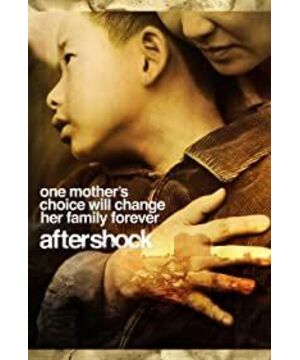Feng Xiaogang did not follow the old pattern of Chinese movies in his films to express some official patents of collective heroism such as "one heart and one mind", but deliberately described the hardships of life and self-salvation of the little people after the earthquake. I think this is true. It is already an improvement. In terms of conception, there is actually nothing to be picky about. What does not express the real history, and does not dig deep into the cause of the disaster, are all very boring ideas. You know a system called "censorship", but you can't estimate the difficulty of creating realistic themes under the system. Restoring history in this country is more difficult than in other places.
Chinese bittersweet films have always had a lot of contrived tears, just like the Spring Festival Gala sketches always have to sublimate their emotions at the end. And the national disaster plus bitterness, this theme seemed to go to the Oscars at first. Chinese films are not without ambitions, but are often too ambitious and lead to developmental deformities. There are no masters or blockbusters in China. If you insist that there are directors who are suitable for making blockbusters in China, Feng Xiaogang is one of them in my eyes. Speaking without prejudice, this film is quite satisfactory in terms of the setting of the storyline. The two lines develop independently and then converge at the end of the film, and the tears are still like that. A period of family destruction brought about by natural disasters, and finally ended in mutual forgiveness and reunion. Feng Xiaogang's narrative method is not much different from his previous films. The struggle of human nature is also relatively powerful for the improvement of this film, except for some such as four The editing like a comic strip and the placement of advertisements are a bit abrupt, but the connection of other parts is fairly smooth. Many people hate this movie, mostly because of Feng Xiaogang's vicious words that are close to moral kidnapping, and the excessive commerciality of the movie's publicity. Maybe this is the original sin of all commercial films. Serious themes will always bear such pressure. Once they are not packaged, they may be disillusioned by the suspicion of the audience. Instead of being devout and moving, they can see that they are naked and primitive. market desire.
The history of the national disaster should not be so simple, but for the current Chinese filmmakers, it can only be like this. In general, there is no problem with this movie, and there is no problem with the level of Chinese audiences. The only problem is the business team behind it and some self-confessed noisemakers. Crying or being moved is just a process of empathy in watching a movie. Even if Feng Xiaogang showed a lot of commercial vileness and insincerity when promoting this film, even if there are countless bugs in the details that are not in line with the background of the times. We were moved only because we didn't have so many bitter and bitter resentments when we watched the movie, we didn't measure it with several standards of the mature American film industry process, we didn't have a sudden sense of historical responsibility, and we didn't feel excited. Forced and forced. We are just a little bit more involved than you after seeing those familiar images. This has nothing to do with the presupposition of the position, the level of IQ, and the sensitivity or prudence of aesthetics and nerves. Of course, after your contempt and sneer, you all have freedom from being moved, no matter where you look at it.
View more about Aftershock reviews











